畅通英语基础教程复习
- 格式:doc
- 大小:32.50 KB
- 文档页数:3
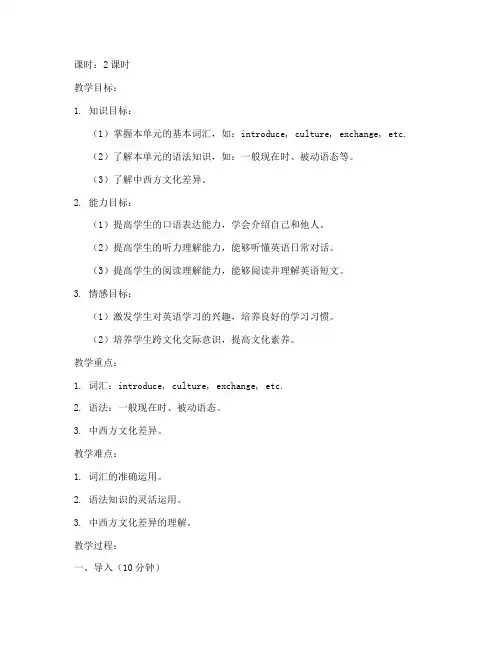
课时:2课时教学目标:1. 知识目标:(1)掌握本单元的基本词汇,如:introduce, culture, exchange, etc.(2)了解本单元的语法知识,如:一般现在时、被动语态等。
(3)了解中西方文化差异。
2. 能力目标:(1)提高学生的口语表达能力,学会介绍自己和他人。
(2)提高学生的听力理解能力,能够听懂英语日常对话。
(3)提高学生的阅读理解能力,能够阅读并理解英语短文。
3. 情感目标:(1)激发学生对英语学习的兴趣,培养良好的学习习惯。
(2)培养学生跨文化交际意识,提高文化素养。
教学重点:1. 词汇:introduce, culture, exchange, etc.2. 语法:一般现在时、被动语态。
3. 中西方文化差异。
教学难点:1. 词汇的准确运用。
2. 语法知识的灵活运用。
3. 中西方文化差异的理解。
教学过程:一、导入(10分钟)1. 教师通过PPT展示本单元的词汇,引导学生复习已学知识。
2. 教师简要介绍本单元的主题,激发学生的学习兴趣。
二、新授(30分钟)1. 词汇教学:(1)教师带领学生朗读并解释本单元的词汇,如:introduce, culture, exchange, etc.(2)通过例句和练习,帮助学生掌握词汇的用法。
2. 语法教学:(1)教师讲解一般现在时和被动语态的用法,通过例句让学生理解。
(2)设计练习题,让学生运用所学语法知识进行口语和书面表达。
3. 文化教学:(1)教师简要介绍中西方文化差异,如:节日、习俗等。
(2)通过案例分析,让学生了解文化差异在日常生活中的体现。
三、巩固练习(20分钟)1. 口语练习:学生分组进行角色扮演,练习介绍自己和他人。
2. 听力练习:播放与本单元相关的听力材料,让学生回答问题。
3. 阅读练习:布置阅读任务,让学生阅读短文并回答问题。
四、总结与作业(10分钟)1. 教师对本节课的内容进行总结,强调重点和难点。
2. 布置作业:(1)复习本单元的词汇和语法知识。
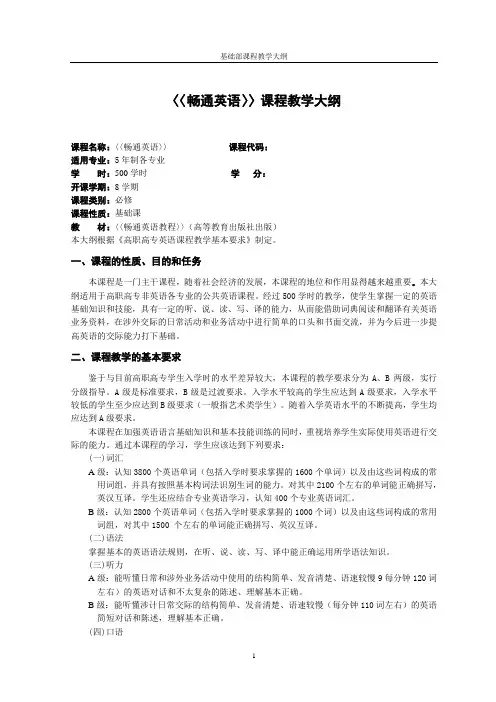
基础部课程教学大纲〈〈畅通英语〉〉课程教学大纲课程名称:〈〈畅通英语〉〉课程代码:适用专业:5年制各专业学时:500学时学分:开课学期:8学期课程类别:必修课程性质:基础课教材:〈〈畅通英语教程〉〉(高等教育出版社出版)本大纲根据《高职高专英语课程教学基本要求》制定。
一、课程的性质、目的和任务本课程是一门主干课程,随着社会经济的发展,本课程的地位和作用显得越来越重要。
本大纲适用于高职高专非英语各专业的公共英语课程。
经过500学时的教学,使学生掌握一定的英语基础知识和技能,具有一定的听、说、读、写、译的能力,从而能借助词典阅读和翻译有关英语业务资料,在涉外交际的日常活动和业务活动中进行简单的口头和书面交流,并为今后进一步提高英语的交际能力打下基础。
二、课程教学的基本要求鉴于与目前高职高专学生入学时的水平差异较大,本课程的教学要求分为A、B两级,实行分级指导。
A级是标准要求,B级是过渡要求。
入学水平较高的学生应达到A级要求,入学水平较低的学生至少应达到B级要求(一般指艺术类学生)。
随着入学英语水平的不断提高,学生均应达到A级要求。
本课程在加强英语语言基础知识和基本技能训练的同时,重视培养学生实际使用英语进行交际的能力。
通过本课程的学习,学生应该达到下列要求:(一)词汇A级:认知3800个英语单词(包括入学时要求掌握的1600个单词)以及由这些词构成的常用词组,并具有按照基本构词法识别生词的能力。
对其中2100个左右的单词能正确拼写,英汉互译。
学生还应结合专业英语学习,认知400个专业英语词汇。
B级:认知2800个英语单词(包括入学时要求掌握的1000个词)以及由这些词构成的常用词组,对其中1500 个左右的单词能正确拼写、英汉互译。
(二)语法掌握基本的英语语法规则,在听、说、读、写、译中能正确运用所学语法知识。
(三)听力A级:能听懂日常和涉外业务活动中使用的结构简单、发音清楚、语速较慢9每分钟120词左右)的英语对话和不太复杂的陈述、理解基本正确。
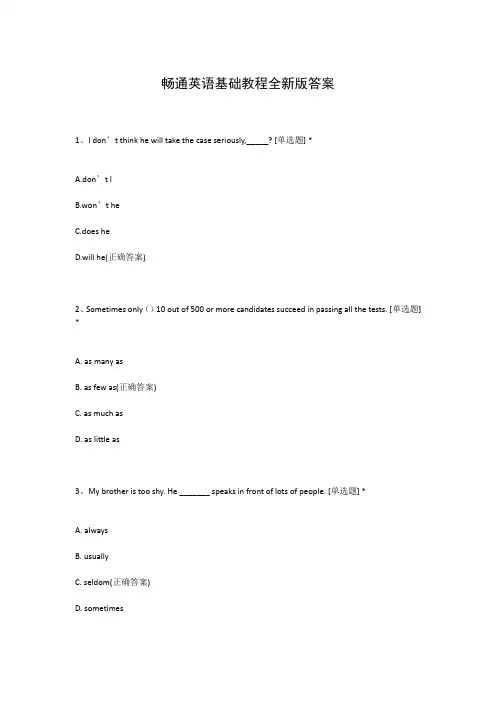
畅通英语基础教程全新版答案1、I don’t think he will take the case seriously,_____? [单选题] *A.don’t IB.won’t heC.does heD.will he(正确答案)2、Sometimes only()10 out of 500 or more candidates succeed in passing all the tests. [单选题] *A. as many asB. as few as(正确答案)C. as much asD. as little as3、My brother is too shy. He _______ speaks in front of lots of people. [单选题] *A. alwaysB. usuallyC. seldom(正确答案)D. sometimes4、Don’t play games on the computer all day. It’s ______ for your eyes. [单选题] *A. bad(正确答案)B. usefulC. helpfulD. thankful5、—Does your grandpa live ______ in the country?—Yes. So I often go to visit him so that he won’t feel ______. ()[单选题] *A. alone; aloneB. lonely; lonelyC. lonely; aloneD. alone; lonely(正确答案)6、______ visitors came to take photos of Hongyandong during the holiday. [单选题] *A. ThousandB. Thousand ofC. ThousandsD. Thousands of(正确答案)7、37.—What will you be ___________?—I'm not sure. Maybe I'll be a doctor like my father. [单选题] *A.right nowB.in the future(正确答案)C.at onceD.at the moment8、Thank you very much. You gave us ____ our factory needed. [单选题] *A. informationB. informationsC. the information(正确答案)D. the informations9、John had planned to leave but he decided to stay in the hotel for _____ two days because of the heavy rain. [单选题] *A. otherB. another(正确答案)C. the otherD. others10、My camera is lost. I am ______ it everywhere.()[单选题] *A. looking atB. looking for(正确答案)C. looking overD. looking after11、16.Lily is a lovely girl. We all want to ________ friends with her. [单选题] *A.haveB.make(正确答案)C.doD.take12、The museum is _______ in the northeast of Changsha. [单选题] *A. sitB. located(正确答案)C. liesD. stand13、He was very excited to read the news _____ Mo Yan had won the Nobel Prize for literature [单选题] *A. whichB. whatC. howD. that(正确答案)14、Its’time to go to bed. _______ your computer, please. [单选题] *A. Turn onB. Turn inC. Turn off(正确答案)D. Turn down15、The()majority of the members were against the idea. [单选题] *A. substantialB. enormousC. considerable(正确答案)D. overwhelming16、Look! There are some boats ______ the river.()[单选题] *A. on(正确答案)B. overC. betweenD. in17、Wang Dong usually gets up at 6:00 _______ he can catch the early school bus. [单选题] *A. as ifB. so that(正确答案)C. untilD. after18、People cut down many trees ______ elephants are losing their homes. ()[单选题] *A. ifB. butC. so(正确答案)D. or19、I’m sorry there are ______ apples in the fridge. You must go and buy some right now.()[单选题] *A. a littleB. littleC. a fewD. few(正确答案)20、The storybook is very ______. I’m very ______ in reading it. ()[单选题] *A. interesting; interested(正确答案)B. interested; interestingC. interested; interestedD. interesting; interesting21、85.You’d better? ? ? ? ? a taxi, or you’ll be late. [单选题] *A.take(正确答案)B.takingC.tookD.to take22、Can I _______ your order now? [单选题] *A. makeB. likeC. giveD. take(正确答案)23、I don’t know how to improve my English. Can I ask you for some _______? [单选题] *A. answersB. advice(正确答案)C. questionsD. words24、They went out in spite of rain. [单选题] *A. 因为B. 但是C. 尽管(正确答案)D. 如果25、She talks too much; you’ll be glad when you’re free of her. [单选题] *A. 与她自由交谈B. 离开她(正确答案)C. 受她的控制D. 与她在一起26、Grandpa pointed to the hospital and said, “That’s _______ I was born?”[单选题] *A. whenB. howC. whyD. where(正确答案)27、Lucy _______ at 7:00 every day. [单选题] *A. go to schoolB. goes to school(正确答案)C. to go to schoolD. went?to?school28、—What ______ your sister ______ this Saturday?—Something special, because it’s her birthday. ()[单选题] *A. are; going to doB. is; going to do(正确答案)C. does; doD. did do29、No writer will be considered()of the name until he writes a work. [单选题] *A. worthlessB. worthy(正确答案)C. worthwhileD. worth30、--Jimmy, you are supposed to?_______ your toys now.--Yes, mom. [单选题] *A. put upB. put onC. put away(正确答案)D. put down。
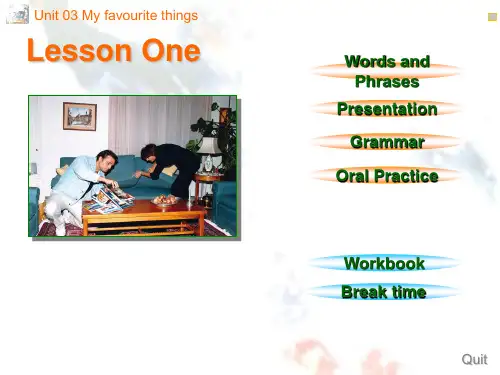
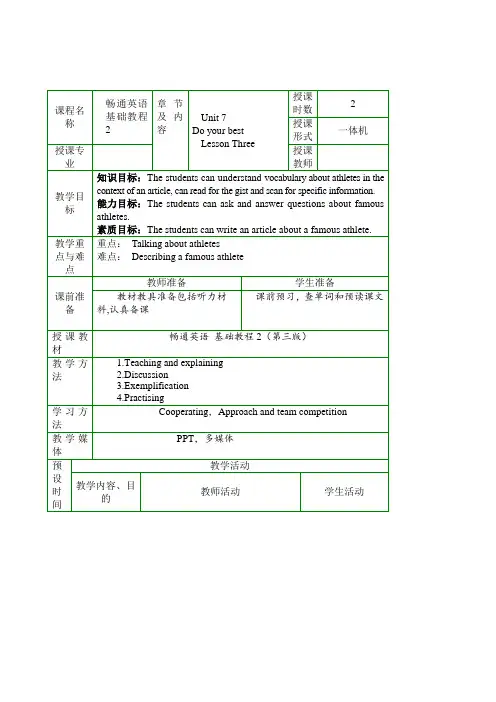
Translation杰斯·欧文斯永远最杰出的运动员。
“惟一重要的胜利是超越自我。
”杰斯·欧文斯1913年生于美国的阿拉巴马。
他出身于一个贫穷家庭,所以学生时代他干了很多兼职工作。
他学习很刻苦,但仍然抽时间从事他最喜爱的娱乐活动——跑步。
他的天赋使他成为中学的田径明星,后来又成为大学里的田径明星。
1935年5月25日,在密歇根州举行的铁人十强锦标赛中,杰斯成为世界冠军。
他一天就打破了三项世界纪录!在后来的三十年里,没有人能打破这些纪录。
杰斯训练刻苦,参加了1936年在柏林举行的奥运会。
在奥运会田径史上,他是第一位在一届奥运会上同时赢得四块金牌(100米、200米短跑、跳远和4×100接力赛)的美国人。
然而,杰斯在体育上的成功没有在经济上给他带来好处。
他努力干过各种各样的工作,以养家糊口。
他死于1980年。
至今,他的家人还管理着杰斯·欧文斯基金,给经济困难的年轻运动员提供在体育方面的发展机遇。
Language Points1.One of the greatest athletes of all time.one of + the + adj. (the superlative form) + n. (pl.)This phrase is used for saying that someone or something is among the best, more ... than most other people or things of the same type.e.g. Johnson is one of the fastest runners in the world.It was one of the most exciting games this year.2. ... so he had many part-time jobs as a student.... so he took many part-time jobs when he was a student.3.His natural talent made him a track star ...make sb sth: make sth out of sb; cause sb to become sth.e.g. This good song made her a popular singer.All work and no play make Jack a dull boy.4. He broke three world records in one day!break a record: beat a record by doing something better or faster than anyone else. The related expressions are “set a record” and “hold a record”.e.g. She broke the world 100m women race record last year.Who holds the world record of the indoor 800 metres?5. Jessie ... took part in the 1936 Olympic Games in Berlitake part in: be involved in an activity with other people;do an activity with other peoplee.g. Most students in our class took part in the sports meeting.Jerry took part in the 4X400 relay and the team finished first. 6.... to this day, his family runs the Jesse Owens Foundation ...to this day: until nowe.g. To this day, I don’t know what started the fire.Even to this day, people still don’t know how our brain works.To this day, we haven’t heard the whole story.。
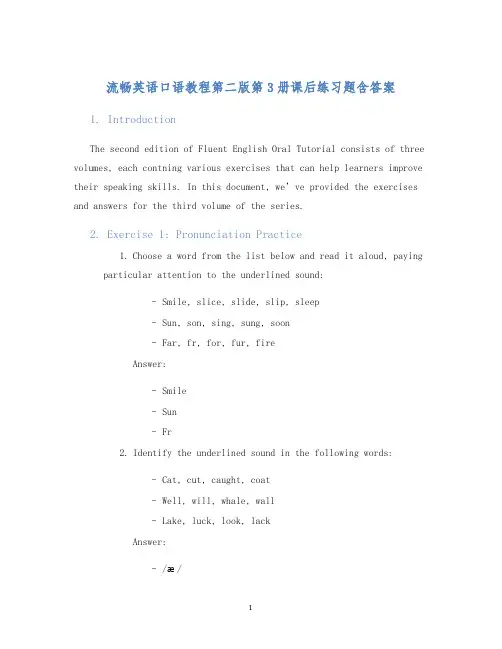
流畅英语口语教程第二版第3册课后练习题含答案1. IntroductionThe second edition of Fluent English Oral Tutorial consists of three volumes, each contning various exercises that can help learners improve their speaking skills. In this document, we’ve provided the exercises and answers for the third volume of the series.2. Exercise 1: Pronunciation Practice1.Choose a word from the list below and read it aloud, payingparticular attention to the underlined sound:–Smile, slice, slide, slip, sleep–Sun, son, sing, sung, soon–Far, fr, for, fur, fireAnswer:–Smile–Sun–Fr2.Identify the underlined sound in the following words:–Cat, cut, caught, coat–Well, will, whale, wall–Lake, luck, look, lackAnswer:–/æ/–/w/–/ʊ/3. Exercise 2: Vocabulary Practice1.Fill in the blank with the correct word from the list below:–Instead, although, although, however, despite–Strong, happy, cheap, busy, safe–She loves to travel by trn, ______ it can be a bit slow.–He didn’t speak English ______ he had been studying it for years.–She decided to go to the party anyway, ______ she was feeling tired.–He is a ______ swimmer who can easily swim long distances.–The traffic was heavy, but ______ she arrived at the meeting on time.Answer:–Although–Although–Despite–Strong–However2.Match the adjectives on the left with the appropriatepreposition on the right:–Proud–Interested–Afrd–Familiar–Ashamed–Of–In–About–With–ToAnswer:–Proud of–Interested in–Afrd of–Familiar with–Ashamed of4. Exercise 3: Speaking Practice1.Discuss the following questions with a partner:–What kind of music do you like to listen to, and why?–Have you ever been to a concert or live performance?If so, describe your experience.–Do you think music can have a positive effect on people’s mood? Why or why not?Answer:Answers to this exercise will vary depending on the learner’s responses to the questions.plete the following sentences about yourself, using the words from the list below:–Passionate, friendly, creative, organized, motivated–I am ______ about learning new things.–My friends often describe me as ______.–In my free time, I enjoy ______ activities, like pnting or writing.–I am good at ______ my work schedule and getting things done on time.–When I face a challenge, I am ______ to find a solution.Answer:–Passionate–Friendly–Creative–Organizing–Motivated5. ConclusionIn this document, we’ve provided the exercises and answers for the third volume of the Fluent English Oral Tutorial series. These exercises can be useful for learners looking to improve their speaking skills and expand their vocabulary.。
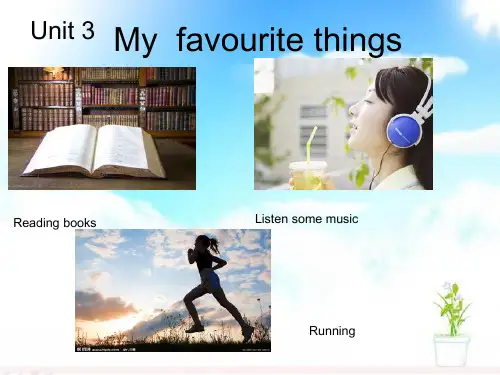
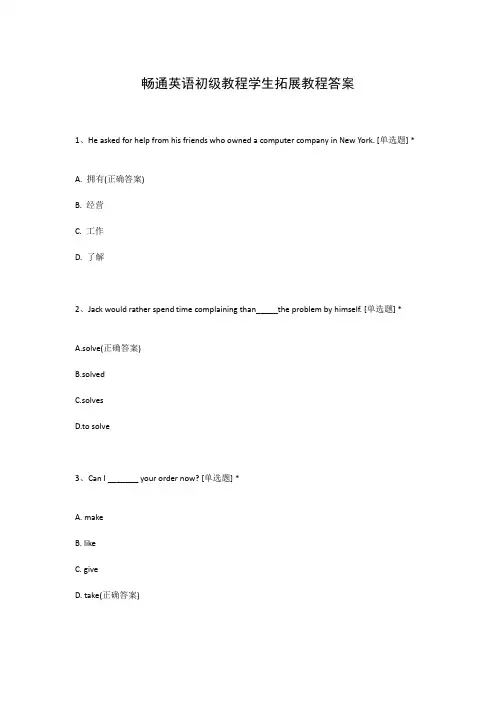
畅通英语初级教程学生拓展教程答案1、He asked for help from his friends who owned a computer company in New York. [单选题] *A. 拥有(正确答案)B. 经营C. 工作D. 了解2、Jack would rather spend time complaining than_____the problem by himself. [单选题] *A.solve(正确答案)B.solvedC.solvesD.to solve3、Can I _______ your order now? [单选题] *A. makeB. likeC. giveD. take(正确答案)4、—______ my surprise, Zhu Hui won the first prize in the speech contest. —But I think he could, because he kept practicing speaking.()[单选题] *A. To(正确答案)B. AboutC. ForD. In5、If you want to _______, you’d better eat more healthy food and do more exercise. [单选题] *A. keep fatB. keep calmC. keep healthy(正确答案)D. keep on6、—Who came to your office today, Ms. Brown?—Sally came in. She hurt ______ in P. E. class. ()[单选题] *A. sheB. herC. hersD. herself(正确答案)7、The early Americans wanted the King to respect their rights. [单选题] *A. 统治B. 满足C. 尊重(正确答案)D. 知道8、It is reported that the fire caused serious()to that school building. [单选题] *A. damage(正确答案)B. destroyC. harmD.hurt9、The old woman doesn’t feel _______ though she lives _______. [单选题] *A. alone; lonelyB. alone; aloneC. lonely; lonelyD. lonely; alone(正确答案)10、Alice hopes to _______ more friends at her new school. [单选题] *A. visitB. make(正确答案)C. missD. take11、24.I often ask my English teacher some questions ________ e-mail. [单选题] * A.by(正确答案)B.inC.forD.with12、If it _______ tomorrow, I won’t go there. [单选题] *A. rains(正确答案)B. is rainingC. will rainD. would rain13、49.________ is the price of the product? [单选题] *A.HowB.How muchC.What(正确答案)D.How many14、The Titanic is a nice film. I _______ it twice. [单选题] *A. sawB. seeC. have seen(正确答案)D. have saw15、She serves as a secretary in a university. [单选题] *A. 为…服务B. 担任…职务(正确答案)C. 竞争…服务D. 申请…职务16、73.The moonlight goes ____ the window and makes the room bright. [单选题] * A.acrossB.through(正确答案)C.overD.in17、He always ______ the teacher carefully in class. [单选题] *A. listensB. listens to(正确答案)C. hearsD. hears of18、97.Go ______ the square and you will find the theatre. [单选题] *A.aboveB.atC.across(正确答案)D.on19、Be careful with the knife. You may hurt _______. [单选题] *A. himselfB. ourselvesC. myselfD. yourself(正确答案)20、3.—Will you buy the black car?No, I won't. I will buya(n) ________ one because I don't have enough money. [单选题] *A.cheap(正确答案)B.expensiveC.highD.low21、How I wish I()to repair the watch! I only made it worse. [单选题] *A. had triedB. hadn't tried(正确答案)C. have triedD.didn't try22、We have _______ a double room with a bath for you in the hotel. [单选题] *A. boughtB. reserved(正确答案)C. madeD. taken23、Sometimes only()10 out of 500 or more candidates succeed in passing all the tests. [单选题] *A. as many asB. as few as(正确答案)C. as much asD. as little as24、—What were you doing when the rainstorm came?—I ______ in the library with Jane. ()[单选题] *A. readB. am readingC. will readD. was reading(正确答案)25、It is important for us _______ English well. [单选题] *A. learnB. learningC. to learn(正确答案)D. learned26、9.—Will there be more cars in the future?—________. [单选题] *A.See youB.Well, I'm not sure(正确答案)C.You're welcomeD.Thank you27、--_______ are the birds doing?--They are singing in a tree. [单选题] *A. WhoB. What(正确答案)C. HowD. Where28、He _______ getting up early. [单选题] *A. used toB. is used to(正确答案)C. is usedD. is used for29、Have you kept in()with any of your friends from college? [单选题] *A. contractB. contact(正确答案)C. continentD. touching30、6.—How can we get to the school?—________ bus. [单选题] * A.ToB.OnC.By(正确答案)D.At。

畅通英语基础教程教案————————————————————————————————作者:————————————————————————————————日期:湖南安全技术职业学院授课教案(2015- 2016学年第 2学期)课程代码:课程名称:大学英语任课教师:崔彪专业班级:应用英语1553、1556班教学周数: 1-3 周学时数: 12课时教研室主任审批:系(部)主任审批:2016年2 月28湖南安全技术职业学院备课纸授课班级应英1556 应英1553第1课教案授课时间2.29 2.29 星期星期一星期一授课地点明203 明103 课题内容Hello!教学目的1. 1. Greeting and saying goodbye2. Understanding classroom language教学方法1.Teaching and explaining2.Discussion3.Exemplification4.Practising重点Greeting and saying goodbye难点Understanding classroom language能力培养Listening, Speaking, Reading and Translation课堂类型New lesson教具None作业Preview Unit 1湖南安全技术职业学院备课纸Procedures:Step1. Leading in:Warm-up Exercises:Review what we learned last period.Step2. Presentation of new materials1. The English-speaking worldMatch the people with the places on the map. Then listen and check your answer.Good morning! I’m Peter and I’m Canadian.——CANADAGood evening! I’m Jim. I’m Australian.———AUSTRALIAGood afternoon! I’m Maria and I’m South African.——SOUTH AFRICA Hi! I’m Emma and I’m British.———UKI’m Melissa. I’m a New Zealander. Good night. ———NEW ZEALAND Hello! I’m Samantha and I’m American.———USAHello! I’m James and I’m Irish.———IRELAND2. GreetingsChoose and complete.Hello.Bye. ———GoodbyeGood nightGood afternoonGood morningGood evening3. Numbers 0-100Listen and repeat.zero one two three four five six seven eight nine teneleven twelve thirteen fourteen fifteen sixteen seventeeneighteen nineteen twenty twenty-one thirty thirty-oneforty forty-five fifty fifty-seven sixty sixty-eightseventy eighty ninety one hundredListen and write the numbers.17 43 62 12 38 20 88 1004. ColoursListen and repeat.What colour is it?white red yellow purple brown greenorange black grey pink light blue dark blueLook at the flags below for one minute and then close your books. Talk in pairs as in the example.e.g. A: What colour is the British flag?5. At schoolListen and repeat.This is Mrs Fletcher.That is Mr Fletcher.Ms Stewart is an English teacher.Miss Lopez is a student.Listen and repeat.book word sentence question picture page paper pen pencilB: It’s red, white and bl ue.6. In classListen and repeat.read write listen speakListen and put the pictures in the correct order. Write 1-11 in the boxes.Stand up.Sit down.Open your book.Close your book.Work in pairs.Read the text.Look at the board.Work in groups of three.Ask and answer questions.Complete the dialogue.Speak in English.Step3. InputP2 Ex. 2 P4 Ex. 3Step 4.AssignmentPreview Unit 1湖南安全技术职业学院备课纸授课班级应英1556 应英1553第2课教案授课时间3.1 3.1 星期星期二星期二授课地点明203 明103课题内容Unit 1 How’s work? Lesson 1教学目的1. Talking about routines2. Telling the time3. Talking about daily schedules and permanent situations教学方法1.Teaching and explaining2.Discussion3.Exemplification4.Practising重点Present Simple(affirmative and Wh-questions) Prepositions of time(at, on, in, from…to…) When? / What time?2.Talking about routines and Telling the time难点Talking about daily schedules and permanent situations 能力培养Listening, Speaking, Reading, Writing and Translation课堂类型New lesson教具None作业P6. Oral practice湖南安全技术职业学院备课纸Procedures:Step 1. I. Warm-up Exercises:Review what we learned last period.Aim: to introduce the topic of the lesson and the main functions presented.Ask Ss if they take part-time jobs, where they work and if they like the jobs.Step 2.Presentation of new materialsAim: to introduce the topic of the lesson and the main functions presented.Ask Ss if they take part-time jobs, where they work and if they like the jobs.PresentationAim: to present vocabulary, structures and functions in the context ofa dialogue between two women talking about their jobs.1.to understand the gist of the dialogue.2.to check comprehension of specific information in the dialogue some important grammar points:How is / are + n.Used for asking someone about their progress or their general situation with concern.e.g.— How are things at the office?— Not too bad.— How is your new job?— Not very interesting.all day longe.g.This baby cries almost all day long.What do you do at home all day long?What about you?1)Used for asking someone the same kind of question he/she has just asked with concern. The similar expression is “How about you?”e.g.— What time do you start work?— I go to the shop at 9:00 every d ay.2)Used for making a suggestion.e.g.I prefer to have coffee. What about you?I’d like to have some cake. What about you?Keys: Sophie: 17:30, 9:00, 9:00-19:00, 9:00-18:00Lisa: 7:00, 20:00, 7:00-20:00, 8:00-13:00GrammarAim: 1.to introduce the Present Simple Affirmative( I, we, you ,they), Wh-questions ( what time/when) and prepositions of time.2. to practice using the structures taught in this lesson in the context of short dialogues.We use the Present Simple for habits or actions that happen regularly.We form the Present Simple Affirmative with the subject and the main verb. In the question form we use the auxiliary verb do in front of the subject and the main verb.Affirmative : I (We / You / They) work.Questions: Do I (we / you / they) work?Preposition of Timeinonatfrom…to and untilKeysa. do you go at inb. relax read on work until on goc. do you and Pete open on open at from toListeningAims :to listen for specific informationto identify timeOral practiceTo give Ss practice in asking and answering about daily schedules Divide Ss into pairsExplain that they should use the prompts in the box and ask each other about heir daily schedules.Have Ss read the exampleHave Ss do the activity.AssignmentPreview Lesson Two and Three.湖南安全技术职业学院备课纸授课班级应英1556 应英1553第3课教案授课时间3.2 3.2 星期星期三星期三授课地点明203 明103课题内容Unit1 How’s work? Lesson Two教学目的1. Asking for more information2. Talking about daily schedules教学方法1.Teaching and explaining2.Discussion3.Exemplification4.Practising重点Talking about daily schedules 难点Describing work能力培养Listening, Speaking课堂类型New lesson教具None作业P8. Oral practice湖南安全技术职业学院备课纸Procedures:Step 1. Leading in:I. Warm-up Exercises:Review what we learned last period.Aim: to introduce the topic of the lesson and the main functions presented Discuss which jobs in words and phrases Ss find interesting/boring and why. Step 2. Presentation of new materialsAim: to present vocabulary, structures and functions in the context of two short articles about jobs1.to use visual information to predict the content of the texts2.to check predictionsto read for gist.Key: the man is a helicopter pilot and the owner of Chattanooga Eye in the Sky Traffic.The woman is a journalist for Newschannel 93.to check comprehension of specific information in the textsStep 3. GrammarAim: to introduce the third person singular of the Present Simple.To practices using the structures taught in this lesson in the context ofshort dialoguesKey:a.work works do presentsb.do go lovesc.speaks speak mean meansPronunciationAim: to present the difference among the /s/,/z/ and /iz/ sounds of the verbs in the third person singular of the PP Affirmative湖南安全技术职业学院备课纸授课班级应英1556 应英1553第4课教案授课时间3.7 3.7 星期星期一星期一授课地点明203 明103课题内容Unit1 How’s work? Lesson Three教学目的1. Talking about daily schedules2. Describing work教学方法1.Discussion2.Exemplification3.Practising重点Talking about daily schedules 难点Describing work能力培养Reading and Translation课堂类型New lesson教具None作业P10.Writing湖南安全技术职业学院备课纸Procedures:Step 1. Warm-up Exercises:Review what we learned last period.Step 2. Presentation of new materialsVocabularyWords related to jobs and dutiesBellboy doorman receptionist chef full-time part-time secretary concierge guest waiter customerNounsBus key place car letter room dish luggage taxi entrance meal hotel phone callVerbsCarry park teach choose prepare type drive serve find takeOther wordsAlso around exactlyExpressionsHave a job tell sb what to do in my carWords and phrasesAim: to present and practice vocabulary related to duties at workKey: c e b a dPre-readingAim: to introduce the topic of the reading text.ReadingAim: To present vocabulary and functions in the context of a magazine article to use visual information to predict the content of the article To read for gist and check predictionsKey: bellboy receptionist bellboy concierge doorman chefListeningAim: to listen for gistKey: Tom part-time , waiterRoy full-time , taxi driverPhil: full-time chefSpeakingAim: to give Ss practice in asking and answering questions about working habits.Writing:Aim: to give Ss practice in writing an e-mail, describing new jobs.Step 3. Assignments1.Review all the new words and phrases in this Unit.2. Preview Lesson one of Unit 2湖南安全技术职业学院备课纸授课班级应英1556应英1553第5课教案授课时间3.8 3.8 星期星期二星期二授课地点明203 明103课题内容Unit 2 Have a good time! Lesson 1教学目的1. Express likes and dislikes2. Stating a desire3. Talking about free-time activities教学方法1.Teaching and explaining2.Discussion3.Exemplification4.Practising重点Expressing likes and dislikes难点Talking about free-time activities 能力培养Listening, Speaking and Writing课堂类型New class湖南安全技术职业学院备课纸Lesson oneStep 1 Lead in DictationQuart er, past, job, workplace, how’s your job? Shop assistant, driver, waiter, waitress, helicopter pilot, reporter, journalist, secretary, teacher, owner, doorman, bellboy, receptionist, concierge, chef, cook. 1.Words and phrasesWhat do you do in your free time? I surf sports.I watch books / newspapers. I listen time with friends I go to the gym. I read TV / videos. I spend to music. I play the Internet. 2.Warm-up: Telling your likesWhat do you usually do in your free time? Step 2. Presentation of new materials Listen and read (1)Questions:❖ Who is Kevin and what does he like doing?Kevin is Dave’s flatmate. He likes going out with his friends from the football team, reading novels and going to the college gym.❖ Who is Kevin and what does he like doing?Kevin is Dave’s flatmate. He likes going out with his friends from the教具None作业P12 Oral practicefootball team, reading novels and going to the college gym.(2)Grammar Points:1.I don’t see Kevin very much…not … very much: not … very oftene.g.People here don’t use public transport very much.I don’t travel very much.2.spend a lot of time with his friends …spend … with sb.a lot / lots of + n.spend a lot of time with his friends …a lot / lots of + n. [ u ] / [pl ]: much; many; a large number/amount/ quantity ofe.g.He has a lot of work to do today.There are lots of animals in the zoo.3. I see.This spoken expression is used for showing that you are payingattention to what someone is saying and that you understand it.e.g.— You do it like this.— I see.4. How often does he come to college?In this sentence, there is no article before “college”, implying“study at college”.Similar expressions: go to school, go to hospitalHow often …?This question is used to ask about the frequency of activities.e.g.❖— How often do you go swimming?— Once a week.❖— How often does she visit her parents?— Twice a year.5.Not reallyIt is used for saying “no” without being very assertive.e.g.— Do you feel sorry for it?— Not really.— Does she like singing?— Not really.(3)Read again and write T for True and F for False.Step 3 Grammar pointsAim:❑How often?❑Present Simple (negative and questions)❑When? / What time?How often: We use such frequency adverbs to talk about how often we do something. We place them: Before the main verb:John often plays footballs on SaturdaysAfter the verb be: Sheryl is never late for schoolPresent SimpleNegative: It is formed with auxiliary verb do / does & not placed between the subject and the main verb.E.g.I don’t go to gym. It’s too hot.She doesn’t give me answer.Its short answer is :Subject + do / does (not)E.g.-Do you (they) study at school?-Yes, I / we (they) do.-No, I / we (they) don’t.-Does he / she / it have dinner?-Yes, he / she / it does.-No, he / she / it doesn’t.5.PronunciationIII.Assignments1.Review all the new words and phrases in this lesson2. Preview Lesson Two.湖南安全技术职业学院备课纸授课班级应英1556 应英1553第6课教案授课时间3.9 3.9 星期星期三星期三授课地点明203 明103课题内容Unit 2 Have a good time!Lesson 2教学目的1.To talk about free-time activities2.Present tense the third singular person教学方法1.Teaching and explaining2.Discussion3.Practising重点Expressing likes and dislikes难点Present tense the third singular person能力培养Listening, Speaking, Reading, and Translation课堂类型New lesson教具作业P14 Oral practicePreview Lesson one of Unit3.湖南安全技术职业学院备课纸Lesson 2Step 1 Leading inWarm-upChoose the activities you like or dislikeStep 2 Presentation of new matirals.Listen and read.(1) Listen to the dialogue and answer the questions(2) read the dialogue again to check the answers.(3) Grammar points.1.What do you think of…?Used to ask for someone’s opinion.e.g.—What do you think of this science fiction?—Very interesting.2.This is the best gig ever.the best … ever: the best … up to nowe.g.❖Daisy is the best student ever in her class.3.… take up half of my CD case.take up: to occupy; to fill a particular amount of space or roome.g.❖Please don’t put the furniture here. It takes up too much space.❖Study takes up most of our timehalf of: either of 2 parts into which something is dividede.g.❖Half of the students are girls in this class.❖Half of the land is green now.4.So what?Why should I care?Used to show no interest in something or thinking it is not important.e.g.—Someone might see us?—So what? We’re not doing anything illegal.5.It’s great fun!be great / good fun: to be an very enjoyable activitye.g.❖Sailing a boat is great fun.❖It will be great fun to have a picnic on the water before we go home.6.I can’t stand it here!I can’t bear the rock music here in the club!sb can’t stand sb / sth / doing sthIt’s used to express that a person dislikes someo ne or something.e.g.❖I can’t stand your talk to me like that.Grammar1.Aim: to present and practice the verb can.Have Ss read the examples and point out the words in bold type.Ask students what they notice about the formation and syntax of can. Elicit the answer that can does not take an –s ending in the third person singular, does not form the negative and interrogative forms with do and is always followed by a bare infinitive. Ask students to read the dialogue.Have students do the activity.Check answers.KeyCan’t help, can surf , can you look for2.AimTo present and practice the structures like enjoy/love/hate/can’t stand+ing湖南安全技术职业学院备课纸授课班级应英1556 应英1553第7课教案授课时间 3.14 3.14 星期星期一星期一授课地点明203 明103课题内容Unit 2 Have a good time! Lesson 3教学目的1. 1. Asking about and describing people’s physical appearance2. Identifying people教学方法1.Teaching and explaining2.Discussion3.Exemplification4.Exercise重点Types of films and phrases难点Geting the gist of the reading能力培养Listening, speaking, reading and wring课堂类型New lesson教具None作业P16 WritingReview all the new words and phrases in this Unit.湖南安全技术职业学院备课纸Step 1 Leading inWarm-up Exercises:Review what we learned last period.Step 2 Presentation of new materialsVocabularyTypes of films and musicAction horror pop comedy jazz science fiction hip pop musical Words and phrases Types of films and phrasesAim: to introduce vocabulary related to films and musicAsk students to write the words in the box under the correct heading.Have students do the activity.Play the CD and ask Ss to check their answers.Key:Film MusicHorror rockMusical classicalComedy popScience fiction jazzAction hip popPre-readingAim: to expand on the topic of the previous activity and prepare students for the reading text.Ask Ss what kind of music/movie they like and elicit answersAsk Ss what they like/don’t like doing in their free time and discuss.Reading1.Aim: to introduce the topic of the reading text through written prompts to read for gistAsk Ss to read the questions a-cAsk Ss to read through the interviewHave Ss do the activityCheck answers.Key: c , a , b.2. Aim: to check comprehension of specific information in the textTo practice scanning for specific informationKey: B , Z, M , M…Z, B, AListeningAim: to listen for specific informationKeys: Cinema: likes, comediesMusic: likes, classicalTV: doesn’t likeBooks: likes, novel.SpeakingAim: to give Ss practice in expressing likes and dislikes and talking about routinesTo report the result of a questionnaire.Writing:Aim: to give Ss practice in writing a paragraph about entertainment preferences based on graphs.Assignments1.Review all the new words and phrases in this Unit.湖南安全技术职业学院备课纸授课班级应英1556 应英1553第8课教案授课时间 3.15 3.15 星期星期二星期二授课地点明203 明103课题内容Unit 3 Nearest and Dearest Lesson 1教学目的1.Talking about family members2. Expressing possession教学方法Brainstorming Lecturing Practicing重点Expressing possession难点Using possessive pronouns能力培养Listening, speaking, reading, wring课堂类型New lesson教具CDs作业1. Review the new words and grammar.2. Preview Lesson Two and Three.湖南安全技术职业学院备课纸Lesson 1Step 1 Leading inWarm-up Exercises:Review what we learned last period.Step 2 Presentation of new materials1. Words and phrasesAim: to introduce vocabulary related to personal items. Ask the Ss to look at the pictures and match the items with the words.Play the CD and check answers.2. PresentationAim: to present vocabulary, structures and functions in the context of a dialogue between a brother and a sister about moving out.Warm-upAim: to introduce the structures of the lesson and the main function presented.Ask some question s such as: This is Lucy’s watch. That’s Judy and John’s desk. This is my bag. This is our classroom. Keys: He’s moving out. He’s carrying his things in a box.T T F T F T3. GrammarAim: to present possessive pronouns and WhoseRepeat using as many possessive pronouns as you canTo present and practice the possessive case’s and compare possessive adjectives to possessive pronouns.Peace’s bag, Tom and Helen’s book, Boys’ car, Children’s toysKeys:This is my brother’s stereo. It’s his stereo. It’s his.This is Tina’s stereo. It’s her stereo. It’s hers.This is our neighbors’ stereo. It’s their stereo. It’s theirs.a.Whose, our, ours, myb.whose, parents’c.Jane’s, her, hers, mine4. ListeningAims: keys: Paul: wallet, Sue: watch, Ken: sunglasses5. Oral practiceAims: to give Ss practice in asking and answering about personal items they own using the verb have.Step 3 Assignment1. Review the new words and grammar.2. Preview Lesson Two and Three.湖南安全技术职业学院备课纸授课班级应英1556 应英1553第9课教案授课时间 3.16 3.16 星期星期三星期三授课地点明203 明103 课题内容Unit 3 Nearest and Dearest Lesson 2教学目的1. Asking about and describing people’s physical appearance2. Identifying people.教学方法Brainstorming Lecturing重点Identifing people especially family members. 难点Describing people’s physical appearance.能力培养Reading, writing and translation课堂类型New lesson教具None作业P20 Oral practice湖南安全技术职业学院备课纸Step 1 Leading inWarm-up Exercises:Review what we learned last period.Step 2 Presentation of new materialsWords and phrases: appearanceAim: to introduce vocabulary related to physical appearanceKeys:1. a beautiful woman and a handsome man2. a chubby girl and a slim girl3.young and old4.long fair hair and short dark hair5. a short boy and a tall boyWarm-upAim: to introduce the topic of the lesson and the main functions presented.I’m tall/short. \What does he/she look like?Have/has to describe people’s appearance.PresentationAim: to present vocabulary, structures and functions in the context of a dialogue. To check predictions and understand the gist of the dialogue.Keys: they are talking about a man and a woman in the restaurant.a.Adam., Mauriceb. Nelly, Mauricec.Ellad. Mandye. Margaret, Nellyf. Margaretg. Maurice, MargaretGrammarAim: to present the difference between a/an and the, the different position of adjectives, to practice the articles a/an/the in context of short dialoguesKeys: a. a, the ,the, - b: -, -.a, -, an,-.PronunciationAim: to present the difference among the/b/,/w/and/v/sounds湖南安全技术职业学院备课纸授课班级应英1556 应英1553第10课教案授课时间 3.21 3.21 星期星期一星期一授课地点明203 明201课题内容Unit 3 Nearest and Dearest Lesson 3教学目的1. Asking about and describing people’s physical appearance2. Identifying people教学方法Lecturing Practicing重点Identifying people especially family members.难点1. Describing people’s physical appearance.2. Writing能力培养Listening, Speaking , Writing课堂类型New class教具None作业Review all the new words and phrases in this Lesson.湖南安全技术职业学院备课纸Step 1 Leading inWarm-up Exercises: 1. Warm-up Exercises:Review what we learned last period.Step 2 Presentation of new materialsWords and phrases family relationshipsAim: to introduce and practice vocabulary related to family relationshipsKeys: grandfather, mother, uncle, brother, wife, sonParents grandparents children husband grandchildrenPre-readingAim: to introduce the topic of the reading text and the main function presentedAsk the students to describe members of their family.ReadingAim: to introduce the topic of the reading textTo present vocabulary and functions in the context of a magazine article to introduce the topic of the reading text through written prompts to read for gistKeys: all about twinsF T T T F FListeningAim: to listen for specific informationTo identify peopleKeys: sister, cousin, wifeSpeakingAims: to give Ss practice in exchanging information about one’s family members. WritingⅢAssignments1. Review all the new words and phrases in this Lesson.。
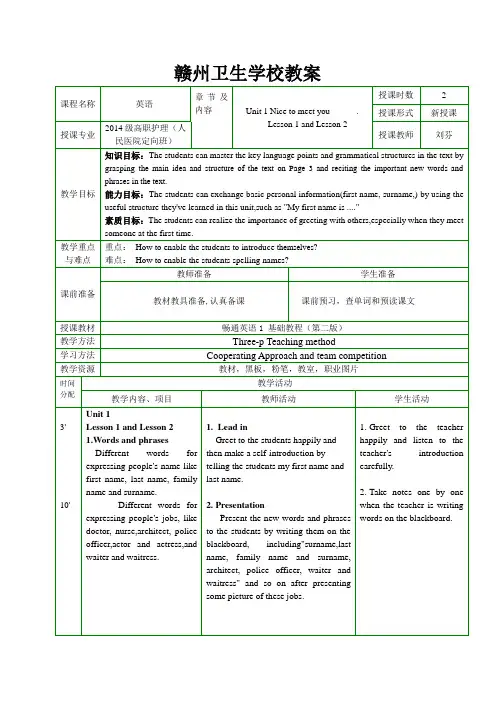
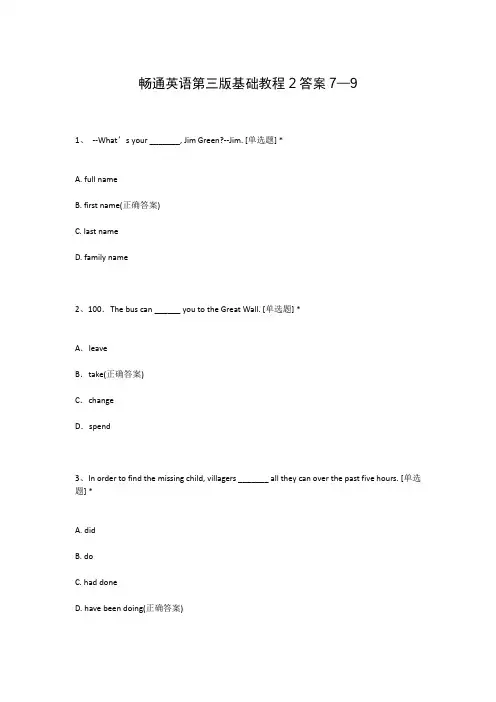
畅通英语第三版基础教程2答案7—91、--What’s your _______, Jim Green?--Jim. [单选题] *A. full nameB. first name(正确答案)C. last nameD. family name2、100.The bus can ______ you to the Great Wall. [单选题] *A.leaveB.take(正确答案)C.changeD.spend3、In order to find the missing child, villagers _______ all they can over the past five hours. [单选题] *A. didB. doC. had doneD. have been doing(正确答案)4、I shall never forget the days()we worked on the farm. [单选题] *A. when(正确答案)B. whatC. whichD. on that5、I knocked on the door but _______ answered. [单选题] *A. somebodyB. anybodyC. nobody(正确答案)D. everybody6、99.—Would you please show me the way _________ the bank?—Yes, go straight ahead. It’s opposite a school. [单选题] *A.inB.forC.withD.to(正确答案)7、My brother is too shy. He _______ speaks in front of lots of people. [单选题] *A. alwaysB. usuallyC. seldom(正确答案)D. sometimes8、Do you know what()the change in his attitude? [单选题] *A. got throughB. brought about(正确答案)C. turned intoD. resulted from9、We are looking forward to _______ you again. [单选题] *A. seeB. sawC. seeing(正确答案)D. seen10、There are still some wild tigers alive. [单选题] *A. 聪明的B. 凶恶的C. 野生的(正确答案)D. 珍贵的11、—Judging from ____ number of bikes, there are not many people in the party.—I think so. People would rather stay at home in such _____ weather. [单选题] *A. the, aB. a, /C. the, /(正确答案)D. a, a12、They returned successfully from ______ moon to _____ earth. [单选题] *A. /; /B. /; theC. the; the(正确答案)D. the; /13、He made ______ for an old person on the bus. [单选题] *A. room(正确答案)B. roomsC. a roomD. some rooms14、Two()in our school were sent to a remote village to teach for a month. [单选题] *A. women teachers(正确答案)B. woman teachersC. women teacherD. woman teacher15、_____you may do, you must do it well. [单选题] *A.WhichB.WheneverC.Whatever(正确答案)D.When16、I am worried about my brother. I am not sure _____ he has arrived at the school or not. [单选题] *A. whether(正确答案)B. whatC. whenD. how17、My father can?_______ a little English. [单选题] *A. speak(正确答案)B. sayC. talkD. tell18、The relationship between employers and employees has been studied(). [单选题] *A. originallyB. extremelyC. violentlyD. intensively(正确答案)19、As for the quality of this model of color TV sets, the ones made in Chine are by no means _____ those imported. [单选题] *A inferior thanB less inferior toC less inferior thanD. inferior to(正确答案)20、—What can I do for you? —I ______ a pair of new shoes.()[单选题] *A. likeB. would lookC. would like(正确答案)D. take21、Could you please ______ why you can’t come to attend the meeting? [单选题] *A. explain(正确答案)B. understandC. giveD. reach22、13.________ it rains heavily outside, Lily wants to meet her children at once. [单选题]* A.IfB.Although (正确答案)C.WhenD.Because.23、John suggest _____ anything about it until they found out more facts. [单选题] *A not to sayB. not sayC to say notD not saying(正确答案)24、Yesterday I _______ a book.It was very interesting. [单选题] *A. lookedB. read(正确答案)C. watchedD. saw25、There is _______ meat in the fridge.Lets go and buy some. [单选题] *A. little(正确答案)B. a littleC. fewD. a few26、I_____you that I had made the right decision. [单选题] *A.ensuredB.insuredC.assured(正确答案)D.for sure27、These plastics flowers look so_____that many people think they are real. [单选题] *A.beautifulB.artificialC.natural(正确答案)D.similar28、63.There will be? ? ? ? ??? water on the road after the heavy rain. [单选题] *A.too much(正确答案)B.much tooC.too manyD.many too29、Nick has always been good _______ finding cheap flights. [单选题] *A. at(正确答案)B. forC. withD. to30、She _______ love cats, but one attacked her and she doesn’t like them anymore. [单选题]*A. got used toB. was used toC. was used forD. used to(正确答案)。
畅通英语第四版进阶教程第一单元答案考试时间:120分钟满分:100分姓名:____________班级:_____________学号:_____________1、I have worked all day. I'm so tired that I need _____ . [单选题] *A. a night restB. rest of nightC. a night's rest(正确答案)D. a rest of night2、John is quite _______. He likes to attend activities in?his spare time. [单选题] *A. active(正确答案)B. quietC. lazyD. honest3、Its’time to go to bed. _______ your computer, please. [单选题] *A. Turn onB. Turn inC. Turn off(正确答案)D. Turn down4、The book is _______. You’d better buy it. [单选题] *A. useful(正确答案)B. uselessC. useD. careful5、I have seldom seen my father()pleased with my progress as he is now. [单选题] *A. so(正确答案)B. veryC. tooD. rather6、I've never been to Africa, but that is the place(). [单选题] *A. where I most want to visitB. in which I most want to visitC. I most want to visit(正确答案)D. that I want to visit it most7、The teachers don't make us wear a school uniform and we can wear _____ we like. [单选题] *A. anyB. thatC. asD. what(正确答案)8、19._______ will the film Country Road last? [单选题] *A.How farB.How oftenC.How soonD.How long(正确答案)9、64.Would you like to drink ________?[单选题] *A.something else(正确答案)B.anything elseC.else somethingD.else anything10、—Tony, it’s cold outside. ______ wear a jacket?—OK, mom.()[单选题] *A. Why not(正确答案)B. Why don’tC. Why did youD. Why do you11、How can I _______ the nearest supermarket? [单选题] *A. get offB. get upC. get to(正确答案)D. get on12、The flowers _______ sweet. [单选题] *A. tasteB. smell(正确答案)C. soundD. feel13、How _______ Grace grows! She’s almost as tall as her mother now. [单选题] *A. cuteB. strongC. fast(正确答案)D. clever14、They all choose me ______ our class monitor.()[单选题] *A. as(正确答案)B. inC. withD. on15、A healthy life is generally thought to be()with fresh air, clean water, and homegrown food. [单选题] *A. joinedB. boundC. lackingD. associated(正确答案)16、—Can you play the violin at the art festival?—No, I ______. But I am good at playing the drums.()[单选题] *A. canB. can’t(正确答案)C. doD. don’t17、Patrick bought her two handbags as gifts,but _____ of them was her style. [单选题] *A. eitherB. noneC. neither(正确答案)D. all18、_____ of the land in this area _____ covered with forest. [单选题] *A. Two-fifth; isB. Two fifth; areC. Two fifths; is(正确答案)D. Two fifths; are19、The beautiful sweater _______ me 30 dollars. [单选题] *A. spentB. paidC. cost(正确答案)D. took20、15.This kind of bread is terrible. I do not want to eat it ________. [单选题] * A.any more(正确答案)B.some moreC.no longerD.some longer21、—______ Tom play the piano?—Yes, very well. ()[单选题] *A. Can(正确答案)B. MayC. MustD. Should22、His handwriting is better than _____. [单选题] *A. mine(正确答案)B. myC. ID. me23、You can borrow my book, _____ you promise to give it back to me by the end of this month. [单选题] *A.even ifB. as long as(正确答案)C. in caseD. even though24、Wang Dong usually gets up at 6:00 _______ he can catch the early school bus. [单选题] *A. as ifB. so that(正确答案)C. untilD. after25、We can _______ some information about this city on the Internet. [单选题] *A. look up(正确答案)B. look likeC. look afterD. look forward to26、Don’t read in bed. It’s _______ your eyes. [单选题] *A. good atB. good forC. bad atD. bad for(正确答案)27、His understanding made a deep impression_____the young girl. [单选题] *A.on(正确答案)B.inC.forD.with28、I like the food very much.It is _______. [单选题] *A. terribleB. expensiveC. delicious(正确答案)D. friendly29、---Where’s that report?---I brought it to you ____you were in Mr. Black’s office yesterday. [单选题] *A. ifB. when(正确答案)C. becauseD. before30、Across the river(). [单选题] *A. lies a new built bridgeB.lies a newly built bridge(正确答案)C. a new built bridge liesD.a newly built bridge lies。
第九单元职业高度句型I get a bit lonely from time to time. 我有时会有点孤单。
You have the opportunity to meet new people. 你有机会认识新人。
Riggers played an important part in their construction. 装配工在建筑中扮演了一个重要的角色。
It seemed only natural to follow in their footstep. 追随他们的脚步看上去很自然。
We install and operate various types of equipment. 我们安装和操作各种各样的设备。
I did a training course and started off as a helper.我经过培训课程然后开始实习助手工作You have to work under dangerous working condition. 你必须在危险的工作环境下工作。
It is absolutely essential that they understand your instructions.明白你的指令是最基本的要素。
It’s necessary to have good communication skills when dealing with fellow workers.和工友协作时必须要有良好的沟通技能。
I took on more and more responsibilities. 我肩负的责任越来越多。
If you have a fear of height. 如果你有恐高症。
Don’t get me wrong. 不要误会我。
I have a scholarship. 我取得了奖学金。
Life at university is fantastic. 校园生活很精彩。
畅通英语初级教程第四版教案教案:畅通英语初级教程第四版教材概述:《畅通英语初级教程第四版》是一本适用于初级英语学习者的教材。
该教材以培养学生的英语听、说、读、写的能力为目标,通过丰富的语言材料和实用的交际功能,帮助学生快速提高英语水平。
教学目标:1. 培养学生的英语听、说、读、写的能力;2. 通过学习交际功能,提高学生的实际应用能力;3. 培养学生的学习策略和自主学习能力。
教学内容:教材《畅通英语初级教程第四版》共分为十个单元,每个单元包含以下内容:1. 单元主题介绍:引入本单元的主题,激发学生学习的兴趣。
2. 词汇与语法:介绍本单元所涉及的重点词汇和语法知识,并通过例句和练习帮助学生掌握。
3. 听力训练:通过听力材料,培养学生的听力理解能力,并通过练习提高学生的听力技巧。
4. 口语训练:通过对话、角色扮演等形式,培养学生的口语表达能力,并通过练习提高学生的口语流利度和准确性。
5. 阅读训练:通过阅读材料,培养学生的阅读理解能力,并通过练习提高学生的阅读速度和准确性。
6. 写作训练:通过写作任务,培养学生的写作能力,并通过练习提高学生的写作技巧和表达准确性。
7. 语法提醒:对本单元所涉及的语法知识进行总结和归纳,帮助学生理解和掌握语法规则。
8. 交际功能:介绍本单元所涉及的交际功能,通过对话和练习,帮助学生掌握实际应用能力。
9. 文化背景:介绍与本单元主题相关的文化背景知识,帮助学生了解英语国家的文化和习俗。
10. 扩展活动:提供额外的学习资源和活动,帮助学生进一步拓展英语学习的领域。
教学步骤:1. 教师引导学生了解本单元的主题,并激发学生学习的兴趣。
2. 教师介绍本单元的重点词汇和语法知识,通过例句和练习帮助学生掌握。
3. 教师播放听力材料,学生进行听力训练,并进行相关练习。
4. 教师进行口语训练,通过对话和角色扮演,培养学生的口语表达能力。
5. 教师进行阅读训练,通过阅读材料,提高学生的阅读理解能力。
畅通英语初级教程第四版单词1、Most cities in the country have introduced“Clean Air Zones”whereby factories and households are only allowed to burn smokeless fuel.在全国大部分城市都有“洁净空气区”因此工厂和家庭只能燃烧无烟燃料。
2、He knows that the pursuit of social status can consume vast amounts of his time and effort.他知道,追求社会地位可以消耗大量的时间和精力。
3、The doctors are at a loss because so far no medicine has been found to inhibit the spread of the disease.医生们正在进行损失,因为到目前为止,没有任何药物能抑制疾病的传播。
4、We see many special education directors trying to maintain the qualityof their programs with much less money and much smaller staff.我们看到许多特殊教育董事试图保持他们的节目的质量以少得多的钱和更少的工作人员。
5、People there are told it is their patriotic duty to support the na t ional cconomy by buying their own products.人们有人告诉他们,通过购买自己的产品来支持国民经济是他们的爱国义务。
6、Darwin's thinking both drew upon and transcended the conventional ideas of his time.达尔文的思想是借鉴和超越他的时代的传统观念。
Channel English Review
一、词语或句子(20分)
颜色(color):
Red红色,Yellow黄色,Green绿色,Blue蓝色,White白色,Black黑色Brown棕色,Pink粉红色, Orange橙色
常用词语(terms):
school学校 teacher老师 student学生 read阅读 write写
listen听 Speak说 book书 page页 picture 图片
word 单词 sentence句子 question问题 look 看 complete 完成ask问 answer 回答 open your book打开你的书
close your book合上你的书
mobile phone移动电话 pen 笔 pencil 铅笔 dictionary字典notebook笔记本 briefcase公文包 bag包 umbrella雨伞
wallet钱包 watch手表 handbag手提包 key钥匙camera相机
glasses眼镜 sunglasses太阳眼镜Cathedral教堂 library图书馆sports centre运动中心Museum 博物馆 hospital医院 bank银行university大学
职业(job):
doctor医生 nurse护士 architect设计师 police officer警官actor男演员 actress女演员 waiter男服务员 waitress女服务员
国家及国籍(countries and Nationality)
Spain西班牙Spanish西班牙人 Italy意大利Italian意大利人France法国French法国人 Mexico墨西哥Mexican墨西哥人Brazil巴西Brazilian巴西人 Japan日本Japanese日本人
Egypt埃及Egyptian埃及人 Canada加拿大Canadian加拿大人
USA美国American美国人 South Africa南非 South African南非人Australia澳大利亚Australian澳大利亚人
Ireland爱尔兰Irish爱尔兰人 UK英国British英国人
形容词(adjectives)
Big大 small小 cheap便宜 expensive昂贵 heavy沉重 light轻的Beautiful漂亮的 ugly丑的 always永远 usually经常 often许多Sometimes有时 never从不
交通方式(Getting around):
I drive开车 I ride my bike 骑单车 I walk步行
I take a taxi搭的士 I take the bus乘坐公交车
I take the underground乘坐地铁by plane乘坐飞机
I take ship坐船 I take a train乘坐火车
周一到周日(from Monday to Sunday):
Monday 星期一 Tuesday 星期二 Wednesday 星期三
Thursday 星期四 Friday 星期五Saturday 星期六
Sunday 星期天
二、练习(10分)
时间(time):
It’s two o’clock 2点钟it’s two five 2点过5分
It’s two forty-five 2点45分it’s midnight 11点
It’s noon12点
数字(numer):
Zero-0 one-1 two-2 three-3 four-4 five-5 six-6 seven-7 Eight-8 nine-9 ten-10
Eleven-11 twelve-12 thirteen-13 fourteen-14 fifteen-15
Sixteen-16 seveteen-17 eighteen-18 nineteen-19
Twenty-20 thirty-30 forty-40 fifty-50 sixty-60 seventy-70 Eighty-80 ninety-90 one-hundred-100
三、看图填词(10分)
Sports(运动):
I paly basketball打篮球 I go windsurfing 冲浪
I play tennis打网球 I play football踢足球
I go swimming游泳 I play baseball打棒球 I go skiing滑雪
I do athletic 跑步
Phrases(休闲):
listen to music听歌 go to the cinema 去看电影 watch TV 看电视Read magazines and newspapers阅读杂志和报刊
Go to restaurants 去餐馆。